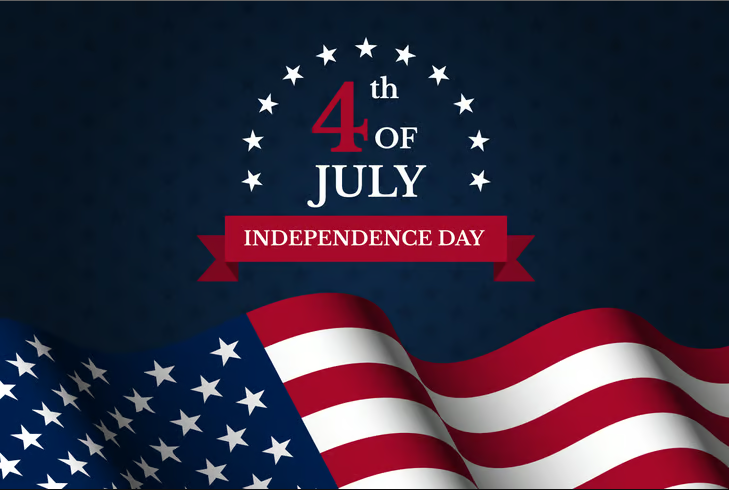Introduction:
Independence Day, commonly known as the Fourth of July, is a cherished American holiday commemorating the adoption of the Declaration of Independence from Great Britain in 1776. On this historic day, Americans celebrate their nation’s birth, honor their heritage, and express gratitude for the hard-fought freedoms they enjoy. In this article, we’ll delve into the significance of Independence Day, explore its traditions, and highlight the festivities that make it a beloved occasion.
The Birth of a Nation:
Independence Day traces its roots to the American Revolutionary War, during which thirteen colonies rebelled against British rule. On July 2, 1776, the Continental Congress secretly voted for independence, and two days later, on July 4, the final wording of the Declaration of Independence was approved and published. This pivotal document declared the colonies’ autonomy and set the stage for the birth of the United States.
Celebrations Across the Land:
Independence Day is a day of joyous family gatherings, picnics, and barbecues. Communities come alive with red white and blue decorations and the American flag proudly adorns homes and public buildings. Sporting events watermelon-eating contests and three-legged races evoke the spirit of freedom and unity. As night falls, spectacular fireworks light up the skies captivating audiences nationwide. Major cities like New York and Washington, D.C. organize parades and public events, while families escape to beaches and vacation spots for a long weekend of celebration.
The Statue of Liberty A Symbol of Freedom:
No celebration of Independence Day would be complete without mentioning the Statue of Liberty an iconic national monument that stands tall in New York Harbor. It welcomes immigrants and symbolizes liberty and hope. As fireworks illuminate the night sky Lady Liberty is a testament to the enduring values of freedom justice and opportunity.
Independence Day:
The Fourth of July—also known as Independence Day or July 4—has been a federal holiday in the United States since 1941. Still, the tradition of Independence Day celebrations goes back to the 18th century and the American Revolution. Let’s dive into the fascinating history:
The History of American Independence:
- On July 2, 1776, the Continental Congress voted in favor of independence.
- Two days later, on July 4, delegates from the 13 colonies adopted the Declaration of Independence a historic document drafted by Thomas Jefferson.
- From 1776 to the present day July 4 has been celebrated as the birth of American independence.
- Growing Sentiments for Independence
- Initially, few colonists desired complete independence from Great Britain.
- However by mid-1776, growing hostility against Britain and revolutionary sentiments (such as those expressed in Thomas Paine’s pamphlet “Common Sense”) swayed many more colonists in favor of independence.
The Formal Adoption:
- On July 2, the Continental Congress formally adopted the Declaration of Independence.
- John Adams believed July 2 was the correct date to celebrate American independence.
July 4th Traditions:
- Festivities range from fireworks, parades, and concerts to casual family gatherings and barbecues.
- Lady Liberty, the Statue of Liberty, stands as a symbol of freedom and hope.
Fun Fact:
Both John Adams and Thomas Jefferson, critical figures in the American Revolution, died on July 4, 1826—the 50th anniversary of the Declaration of Independence1.
As we celebrate Independence Day, let’s reflect on the enduring spirit of liberty and the ideals that shape our nation.
FAQs About Independence Day 2024
Is Independence Day a Public Holiday?
Yes, Independence Day is a state public holiday. State government offices are closed, and some schools and businesses may observe the holiday.
When Is Independence Day 2024?
Independence Day falls on Thursday, July 4, 2024.
What Happens If July 4 Is a Weekend?
If July 4 is a Saturday, the holiday is observed on Friday, July 3. If it’s a Sunday, the observance shifts to Monday, July 5.
How Do Politicians Participate?
Politicians attend public events to show support for their country’s history, heritage, and people.
What Should I Know About Fireworks?
Communities arrange fireworks displays after dark, and the most impressive ones are broadcast on television.
Conclusion:
As we gather with loved ones on Independence Day 2024, let us remember the sacrifices of the past and celebrate the enduring spirit of liberty. So, as the fireworks burst, let me leave you with this question: How will you continue to uphold the ideals of freedom in your own life?
Independence Day 2024 in the United States is not just about fireworks—it’s about honoring our shared history and embracing the promise of a brighter future.



